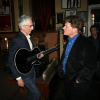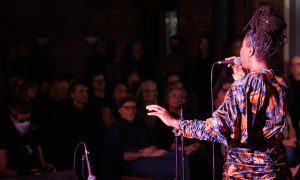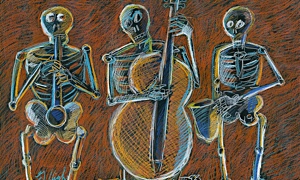Home » Jazz Articles » What is Jazz? » Jazz and Moral Theory: Swinging the Right Way
Jazz and Moral Theory: Swinging the Right Way
Morality matters to music as well. Consider piracy, contractual obligations, fair compensation for work, plagiarizing songs without credit, and more. In 2000, Pat Metheny made a blistering moral argument against Kenny G's posthumous "duet" with Louis Armstrong, calling it "musical necrophilia." Metheny argued that while his recording was legal, it was not moral, because a founding genius of jazz should not be artificially paired with the pied piper of kitsch. This incongruous and foolhardy pairing violated a virtuous musical legacy. This ought not to be done. It is morally wrong, as well as being aesthetically agonizing. Moral judgments (right or wrong) are everywhere—in sports, education, media, religion, and so on. Jazz, however, offers us some insights into moral theory, which I will explain briefly.
Duties for Musicians
Rules for living form one part of moral theory. Deontology teaches that morality rests on duties to obey rules or commands. To obey these duties is right; to disobey is wrong. The Ten Commandments in the Hebrew Bible (Exodus, chapter 20) are deeply deontological. We are to obey God by having no other god, by not taking God's name in vain, by making no false image of God, by observing the day of rest, by honoring our parents, by not murdering, not stealing, not bearing false witness, not committing adultery and by not coveting anything that belongs to someone else.
Jazz does not have a fixed set of Ten Commandments, written in stone (like what Moses received on Mount Sinai), but this rich tradition has enshrined its imperatives which bear on more than just music. Consider a three of them.
1. Remember your roots. Jazz is a narrative of personalities, composers, musicians, and all the culture that accompanies them. There is no jazz without a grateful memory. However much musicians may veer off from the past, they must still build upon it. Even some of the most experimental or free jazz players, such as Sun Ra, are working within a tradition.
2. Honor your fellow musicians. Jazz, apart from solo performances, is a collaboration of like-minded souls in love with their music. They cannot love the music without, in some measure, loving each other enough to create this great music together without any competition. Seeing and hearing Joey DeFrancesco trade chops with his guitarist at DazzleJazz in Denver illustrates honor among musicians. This was no cutting session, but pure enjoyment which summoned the best from both musicians. But even most cutting sessions are usually done in good humor, thus eliciting the best in both players. When Terri Gross interviewed Branford Marsalis on "Fresh Air" some years ago, the virtuoso saxophonist recounted a time on stage playing with tenor titan, Sonny Rollins. Marsalis made it clear that he was out-played (it was much earlier in his career), but that this was not demoralizing. He was honored to be there.
3. Do not let ego get in the way of truth or beauty. After a magical performance by clarinetist Anat Cohen's band at DazzleJazz, I talked with the bandleader briefly about the gig. Improvisation at the highest levels, she said, is not about competition, but of letting the music happen. I said, "There is no place for ego, is there?" She agreed with a smile. Jazz at its best is free of coveting center stage or highest billing. The gift of music is received and offered to the audience. The applause is also a gift, but the greatest musicians do not play for applause only. They play for excellence.
During an interview, jazz guitar great Pat Metheny said that when the band is really in the groove, it almost makes the next performance harder, since a new level of achievement beckons. Metheny could not rest content with an excellent performance, resting on his considerable laurels. He is called higher, leaving little room for self-congratulation or self-centeredness with respect to the music.
Virtue and Vice
The cultivation of virtue and the avoidance of vice is another indispensable element of moral theory and the moral life. Knowing that I should not forget the roots of jazz, dishonor other jazz musicians, or let ego block musical achievement is one thing—and not a small thing. But being the kind of person who gladly follows these wise rules requires settled habits of being. A virtue is an inclination to be a certain kind of person in specific situations. One cultivates virtues by knowing what is good and then by working that reality into one's soul through practice.
The classic virtues of moral philosophy are prudence (or wisdom), fortitude, courage, temperance. Let us consider but two of them: fortitude and courage.
The phase "spending time in the woodshed" in jazz means to learn the tradition through extended practice. Jazz requires fortitude (or endurance) in what is excellent musically. Musicians may develop muscle memory such that certain chops become automatic when called upon. Pat Metheny has said that he can play certain riffs without thinking. His good habits have internalized musical virtues. Anyone can make mistakes without thinking about it. But to play with excellence as second nature and without conscious articulation comes only as the fruit of right habits. In the Sermon on the Mount, Jesus emphasized fortitude when he said, "Blessed are those who hunger and thirst for righteous, for they will be satisfied."
Courage, according to C.S. Lewis, is necessary to mobilize and fortify all of the other virtues. To quote the word master:
Courage is not simply one of the virtues but the form of every virtue at the testing point, which means at the point of highest reality.
One needs courage in order to have fortitude, prudence, or temperance, says Lewis in The Screwtape Letters.
According to Aristotle in his Nicomachean Ethics, the virtue of courage needs to be placed between two non-virtuous extremes—one of excess and one of deficiency. This is the golden mean. One is merely rash for doing a fearful thing for no good reason. This is excess. It is rash to place all of one's savings into an uncertain investment. One is cowardly if one refuses do the urgent thing even when it requires risk. It is cowardly to refuse to take a necessary test—such a driver's license test or the SAT—when it is necessary for one's own good. This is a deficiency. How does any of this bear on jazz?
There is a time to get out of the woodshed and step on to the stage. "There is a time for every purpose under heaven," as the Preacher of Ecclesiastes says, but it is hard to discern the timing. Musicians need to know what time that is. This is not easy. Cocky young musicians may (literally) blow their own horn too loud and too long in the wrong settings. Bad timing in this is linked to command #3, mentioned above: Do not let ego get in the way of truth or beauty.
While at Churchill Grounds in Atlanta recently, I saw an experienced local jazz singer, Evan Sarver, coax a young female singer onto the tiny stage. She was more than ready, but needed encouragement. She had courage, but that courage was solicited by kindness. She had been in the woodshed and so was ready for the stage. This episode reveals that courage does not thrive in a vacuum. Intrepid jazz musicians—and the rest of us—need wise friends to help us interpret ourselves. Ironically, others may know us better than we know ourselves. It happens often, if we listen, if we have big ears.
Moral theory and the moral life encompass much more than what I wrote here, but my aim was to show that jazz lives within a moral structure as well as everything else under the sun. We could all spend some profitable time in the woodshed pondering these ideas, as jazz musicians and as human beings who live in a shared moral world.
Tags
pat metheny
What is Jazz?
Douglas Groothuis
United States
Colorado
Denver
Kenny G
Louis Armstrong
Sun Ra
Joey DeFrancesco
DazzleJazz
Branford Marsalis
Sonny Rollins
Anat Cohen
Atlanta
Evan Sarver
PREVIOUS / NEXT
Pat Metheny Concerts
Mar
5
Thu
Support All About Jazz
 All About Jazz has been a pillar of jazz since 1995, championing it as an art form and, more importantly, supporting the musicians who make it. Our enduring commitment has made "AAJ" one of the most culturally important websites of its kind, read by hundreds of thousands of fans, musicians and industry figures every month.
All About Jazz has been a pillar of jazz since 1995, championing it as an art form and, more importantly, supporting the musicians who make it. Our enduring commitment has made "AAJ" one of the most culturally important websites of its kind, read by hundreds of thousands of fans, musicians and industry figures every month.


























